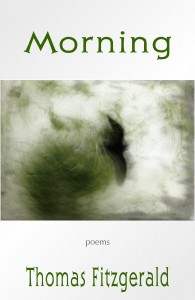
Thomas Fitzgerald’s “Morning” (Reviewed by Eleonora Luongo)
Thomas Fitzgerald’s chapbook, Morning, is a short collection of meditative narratives that revolve around a lonely – and mostly alone – narrator floating through a world of strangers and ghosts. This might sound bleak, and it often can be, but as the title suggests there is always a little bit of hope that the light will come, morning will return to make things a little easier. In the opening poem, “Please Do Not Seize”, the narrator is in some kind of bed-ridden fever, unable to move or communicate, a theme that will recur again and again throughout the eleven poems that make up the collection, and the anonymous “they” are telling him to “Give it time. The sun is shaking the dark hand of night. Wait.” It’s more than hope; it’s a certainty that this condition is only temporary, however long it might seem.
The mix of mostly free verse and prose poems and simple, conversational diction force the attention of the reader squarely on the narrator. There’s an “I” at the center of each poem, and the only other people who populate the collection are either people he doesn’t have any significant contact with or squarely in the past. The I is a wanderer, and one gets the sense that he is looking for that ‘morning’ that we’ve been given in the title, but which hasn’t yet materialized. Fitzgerald takes a big risk with the reader here – if the narrator is unlikeable, the entire collection could read like a bad journal. But he makes it work for him.
 The poems are bigger than just one man’s search for forgiveness and connection. They are poignant description of the human need to be connected in a significant way to others, to not be completely alone. In one of “The Institution Poems”, a boy sharing the room with the narrator “wakes occasionally, asks me,/ in the darkness, if I’m still there.” In a world where friends and family are always referred to in the past or appear as ghosts, as in the memory of a father who “told me not to throw/ against our clean white house,” or the woman who said “I think/ it’s time you be leaving”, or else strangers handing out rules and medication, the need to connect with someone else is primal. In a late night supermarket, the narrator wanders under the flourescent lights, “desperate to reach out/ to the next person who passes by./ To touch the wound of his life.”
The poems are bigger than just one man’s search for forgiveness and connection. They are poignant description of the human need to be connected in a significant way to others, to not be completely alone. In one of “The Institution Poems”, a boy sharing the room with the narrator “wakes occasionally, asks me,/ in the darkness, if I’m still there.” In a world where friends and family are always referred to in the past or appear as ghosts, as in the memory of a father who “told me not to throw/ against our clean white house,” or the woman who said “I think/ it’s time you be leaving”, or else strangers handing out rules and medication, the need to connect with someone else is primal. In a late night supermarket, the narrator wanders under the flourescent lights, “desperate to reach out/ to the next person who passes by./ To touch the wound of his life.”
Alcohol is a recurring theme, that vicious cycle of forgetting, doing things you regret, and waking up to a feeling of being lost and guilt. It’s mentioned in no less than five poems. In “That Alcohol Thing”, the narrator overhears a woman alluding to her child’s father’s alcoholism, “says the words relapse and that alcohol thing. I could talk to them, tell them how I wake up and drink a beer for each day of the week, how I need something to pacify me.” But these thoughts remain unsaid.
In other poems, there’s always that mild surprise, no matter how often it’s happened before, as in “Waking”, where “Today I could not have known/ I would be lost again.” or in “The Institution Poems”, where the speaker finds himself in a place where “I have no shoelaces/ and I don’t know why” or in “Waiting Room”, where “I don’t know what I’m waiting for.” In the poignant “Also, The Beer In The Older Man’s Car Had Something To Do With It, it’s implied that a younger version of the narrator is taken advantage of by an older man bearing beer and drugs. The poem is all the more tragic because the speaker tells it so unsentimentally, ending with “this is how disgusting I am. I puked in a stranger’s bathroom but didn’t make it to the toilet bowl.”
I read this book on a sunless, gray day after several straight days of rain and drizzle. It was one of those weeks where you wonder if the sun will ever come back out, even if rationally you know it will. That’s the sentiment the poems seem to echo. The narrator knows light will come back, and if you look far enough in the distance you might even see a break in the clouds somewhere, but right now it’s just barely out of reach.
Morning is available October 21, 2011 from Finishing Line Press.
Eleonora Luongo lives and works as a writer and web designer in New Jersey (note: she does not pronounce it “Joisey”). Her writing has recently been published in Flashquake, mad swirl and Used Furniture Review. She is the founder of summerofsisterlove.com and tweets as @phigirl.
Thank you for this review. It’s very thoughtful and really gets at what I was trying to do. Tom F.